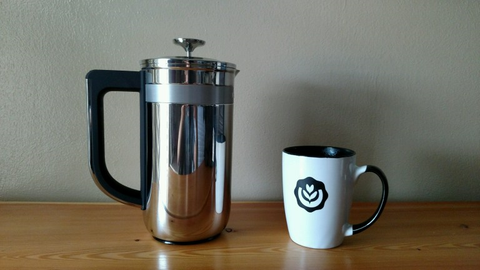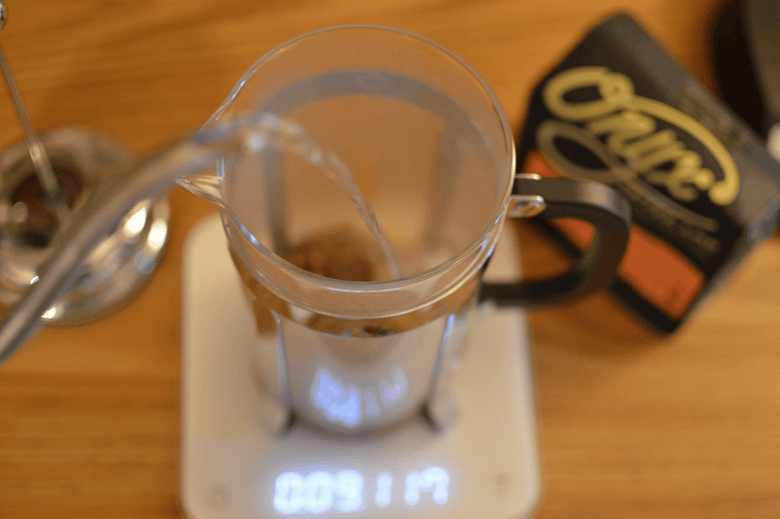Ah, the french press. This classic coffee brewer is refined, beautiful, and brews a killer cup of coffee. I remember choosing my first french press - and the struggle that the decision was.
A metal or glass french press. Which one should you buy?
I’m familiar with the decision you’re trying to make and have helped dozens through the process. The trick to a confident, researched position is to break down the advantages and disadvantages and take a good look, rather than trying to decide from a bird’s eye view.
Let’s walk through the differences between metal and glass french presses together. I’m confident the best option for you will be very clear by the end of this article.
Read: Why You Should Ditch Your Drip Coffee Pot For A French Press
The Advantages Of The Glass French Press
The glass french press is the quintessential french press. We’ve all seen pictures of a brewing french press on the beach or by a window with a great view. It’s classic, beautiful, and well functioning.
As long as it’s made with high borosilicate and heatproof glass, the carafe won’t break easily. I’ve knocked my french press against doorknobs, counters, and mugs countless times, but it’s still brewing like a champ.
But, to be frank, chances are high that you’ll eventually crack your french press carafe at some point. Thankfully, these are easily removed and replaced, making glass french presses a buy-it-for-life brewer.
Avoid cheaply made and sold french presses. If you find one for $18 or lower, it’s not the kind you want. There are plenty of those, but the glass is thin, the filters fall apart, and the frames break. Trust me, you won’t be using that same french press five years down the road.
Read: The Ultimate Guide To French Press Coffee
One major advantage of the glass french press is the ability to see what’s happening during the brewing. We eat and drink with our eyes (not literally), so being able to see the coffee brew allows the coffee experience to begin even before the coffee is brewing, which elevates coffee time to a new level.
High-quality glass also does a great job of maintaining heat for long enough to brew a french press. I’ve heard many people express concerns over this, but unless your recipe requires a 20 minute steep, you’ve got nothing to worry about.
Glass looks incredible, feels goods, and makes coffee brewing a visual experience as much as a tasting one. There’s a reason glass french presses are the preferred type of home decor specialists and designers.
Pros:
- Classic feel and function
- Visual element adds to overall experience
- Easy to replace glass carafe
- Immediate heat retention for a short amount of time
- Buy-it-for-life brewer
Cons:
- Glass does break and accidents happen
- Yeah, that’s about it.
Read: 5 Things Every French Press Coffee Lover Should Know
The Advantages Of The Metal French Press
The metal french press is a durable powerhouse. Many bustling cafes opt for metal presses instead of glass to reduce the risk of smashing things together and creating messes. But unless your kitchen has three baristas making dozens of french presses per day, I doubt you’ll really need to take the precaution of a metal press.
Coffee shops can get away with metal french presses because customers don’t often see the brewing process. They only see the final mug delivered to them. You, however, miss out on the visual aspect of french press brewing when you go with a metal french press.
You don’t get to see the swirling of the coffee grounds in the brewing liquid. You don’t get to see the rising and falling of grounds as they release aromas and flavor into the water. It’s a bit of a shame and the cost of improved durability.
Read: How Manual Coffee Brewing Can Change Your Life

Metal french presses are also buy-it-for-life brewers, but once they’re dented, they’re extremely difficult to un-dent. They’ll serve you for decades, but they won’t always be in prime condition.
One minor downside to large stainless steel brewers is that they need to be preheated before you start brewing your coffee. It does preserve temperature better than glass once it’s heated, but if you don’t preheat, you run the risk of your brewing water being too cool to produce a balanced cup of coffee. Preheating isn’t hard at all, but it is another step to consider.
Metal french presses are strong, sturdy, and are more easy to travel with. However, if you’re looking for a stellar travel coffee setup, I suggest you check out the Aeropress.
Pros:
- Extremely durable
- Buy-it-for-life brewer
- Great heat retention after preheated
- More suited for travel
Cons:
- No visual experience
- Requires preheating
Which Is Right For You?
The differences between glass and metal french presses aren’t major, but they’re just big enough that one of them will suit your lifestyle and personal preferences more than the other.
Glass french presses are perfect for most people. They brew great coffee, the add in the visual element of brewing, and they’re fun and rewarding to use. You may break the glass eventually, but the mental rewards of being able to see your handiwork being created makes it worth it.
Read: 5 Ways To Up Your Coffee Game
Metal french presses are great for people who are on the extra clumsy side or live in an environment where things can easily be broken. This style press is also great for people who love to take french press coffee on the road.
I can’t make the final call for you, but you now have all the information you need to narrow down your search for the perfect french press. In the end, no choice is the wrong one. Both carafe materials will brew great coffee.
Happy french press brewing!


